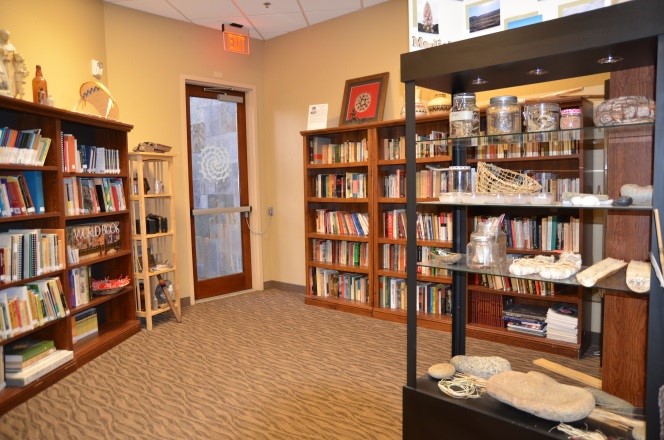
Established in 2003, through an Administrative for Native Americans (ANA) Grant, the Soboba Cultural Center, originally named Cham-Mix Poki “house of our culture”, was designed to develop educational programs on traditional culture, and to promote workshops on Luiseño and Cahuilla cultures. Originally housed in the DQ University modular trailers surrounding the Soboba Tribal Hall, the Cultural Center was moved multiple times and currently resides on the first floor of the Soboba Tribal Administration Building. As the collections of literary and cultural materials grew, a library was established with the donation of books on various North American Indian topics. Having outgrown its original mission in 2009, the Cham-Mix Poki was restructured and became the Soboba Cultural Center and Research Library.
The Soboba Cultural Center and Research Library strives to promote the understanding, appreciation, contribution, and the unique role that the Soboba Band of Luiseño Indians have played in the history of Southern California; this is done through offering programs that enhance the education and the preservation of Luiseño and Cahuilla heritage and culture, as well as acting as a repository for the Tribe’s historical material and items of cultural patrimony. The collections housed at the Soboba Cultural Center and Research Library consist of various documents, newspapers, photographs, books, audio-visual materials, and 3-D objects. Each of these categories holds invaluable historical materials that tell the story of how Soboba has consistently persisted and thrived.
In 2020, the Soboba Cultural Center and Research Library was awarded a 2-year grant from the Institute of Library and Museum Services, to steward large portions of the historical and archival collections. Incorporating formal museum and archival practices, staff is currently in the process of inventorying, cataloging, digitizing, and rehousing collection items.
Due to current COVID-19 restrictions, the Cultural Center is operating with limited access in an effort to minimize the spread of the virus.